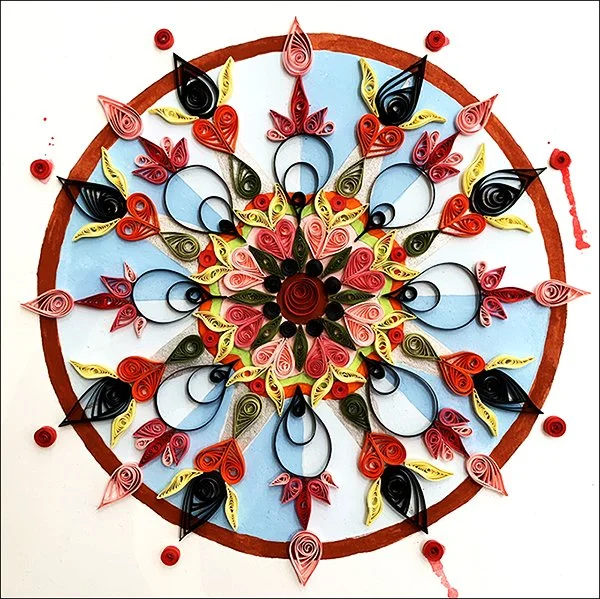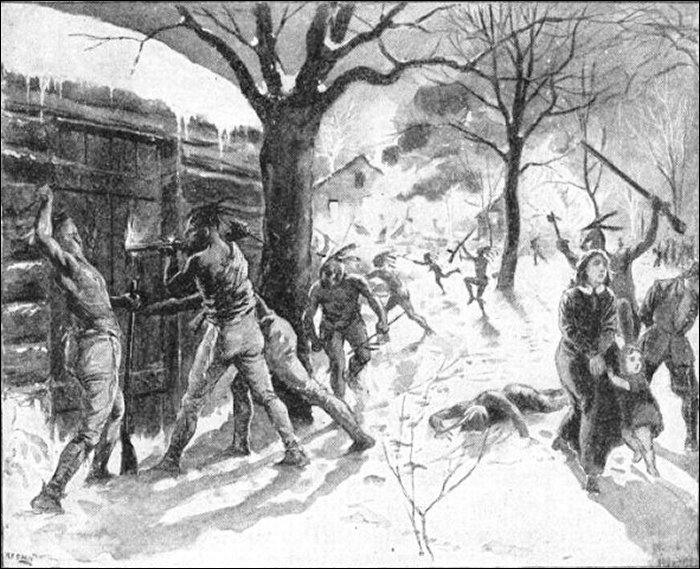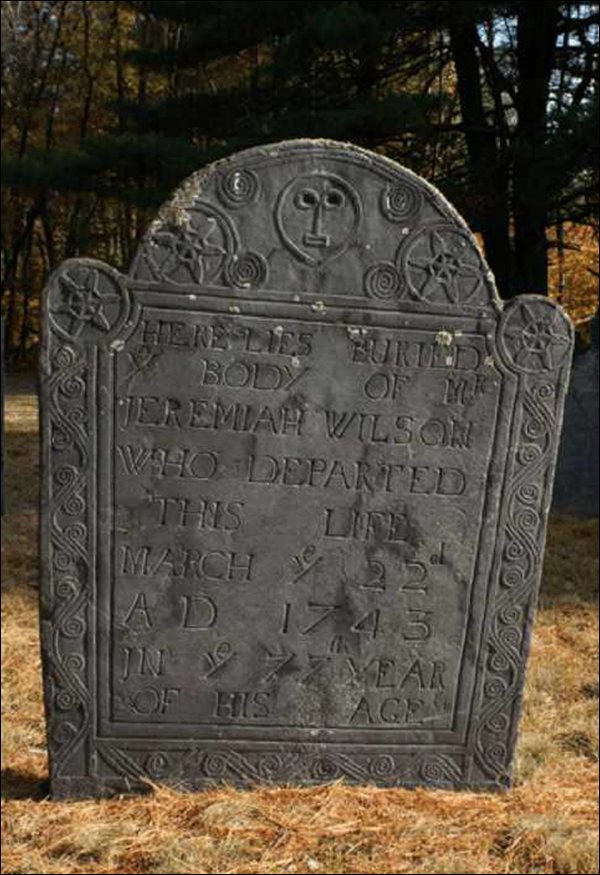Strangers for Ancestors #5: Nashaway / Lancaster
The Wampanoag defending their ancestral homeland from the European invaders, 1676
And the story continues …
My great, great, great, great, great, great, great, great, great grandfather Jeremiah Wilson was born on 22 August 1665, in Charlestown, Middlesex, Massachusetts Bay Colony, British Colonial America, to Benjamin Wilson, 27 and Anne Fuller, 30. A year later, Benjamin would die at sea. Anne would remarry five years later to a man named George Cannoway.
At the age of 22, Jeremiah would marry Hannah Beaman on December 27, 1687 in Watertown, Middlesex, Massachusetts Bay Colony. Hannah was also born in Charlestown in 1665 to Sarah Clark and Gamaliel Beaman; she was the 10th of 12 children, and 16 years younger than the eldest child. The Clark and Beaman families were Puritans, (also known as Congregationalists, or, Christian Protestants) who had come to the Massachusetts Bay Colony as part of the European invaders from England. Jeremiah and Hannah were the first generation in their family to be born in America.
Jeremiah and Hannah made their home in Lancaster in 1688.
Lancaster was first settled as "Nashaway" (the name of the tribe of Algonquian Indians for whom the land belonged) by a group of settler-colonizers known as the Nashaway Company, who were likely interested in the iron deposits in the area. The town was officially incorporated and renamed "Lancaster on the Nashua" in 1653.
Megan Wilson, Stains Series: Nashaway/Lancaster, quilling (paper craft) on paper, 9” x 9” unframed, 12.5” x 12.5” framed, 2021
Members of the Beaman family began moving to Nashaway Massachusetts in 1659 to settle the stolen land there. In 1676 the settlement of invaders at Nashaway was attacked by a force of 1,500 Wampanoag, Nimpuc, and Narragansett Natives, led by Sachem Metacomet or King Philip, the name given to him by the English. They attacked five fortified houses. The house of the Rev. Joseph Rowlandson was set on fire, and most of its occupants were killed — more than 30 people. Rowlandson's wife Mary was taken prisoner, and later wrote a best-selling captivity narrative of her experience. Many of the community's other houses were destroyed before the Indigenous tribes, who were defending their ancestral homeland, retreated northward; the Beaman’s home was one of these.
The Story of King Philip’s War, as told by two different sources:
Supporters of Lancaster's first settler-colonizer, John Prescott, born in 1604 (great grandfather of Bunker Hill leader William Prescott), wished to name the new settlement Prescott, but the Massachusetts General Court considered such a request from a common freeman presumptuous, given that at that time, not even a governor had held the honor of naming a town after himself. Instead, they decided on Lancaster, the name of Prescott's home town in England.
Jeremiah and Hannah made their home in Lancaster in 1688, twelve years following the attack by the Indigenous ancestral inhabitants and stewards of the land. Jeremiah was probably a farmer, as this was the work most settlers in the area were engaged in at this time, undoing the work of the Indigenous tribes that had cultivated the land for millennia prior to the destructive invasion by the European settler colonizers.
Joseph Wilson, the first child of Jeremiah and Hannah, was born in Lancaster, Worcester, Massachusetts on September 1, 1692. At the time Joseph was born in Lancaster, settlers in the New England colonies built what were known as Garrisons, which were wooden houses with reinforced outer walls, similar to forts, and sometimes had watchtowers and gated walls around them. The Garrison houses were built so they were near to the groupings of three to four farms in each area that the local settlers would flee there to for shelter in times of attack by the Indigenous tribes defending their rightful homeland, which they were watching be destroyed by the settlers. Sometimes the Governor and Court of Massachusetts would station a few soldiers at each Garrison, and the local residents were responsible to house and feed the soldiers at their local Garrison.
On February 14, 1693, the settlers of Lancaster petitioned the Governor and Council of Massachusetts, stating that they had
“both formerly and of late been expossed to very great troubles & charges by Reason of ye Long continued war with ye Indians: severall persons being killed by them & others haveing Lost great part of theire estate by them: & also by being so long Nessessitated to live in Garison where neither men nor women can doe but very litle towards ye supply of theire familyes; theire being so mutch time spent in watching and warding & many allarrums” “many are brought to extreame poverty, not knowing how to get either food or cloathing for themselves or famillys: also ye great charge expended in building Repairing & maintaining so many Garissons: eight of which being allowed by order” “we being so few in number & so unable to defend ourselves.”
On September 14, 1697, Governor William Stoughton of Massachusetts Bay, wrote to the Governor and Council of Connecticut that forty Indians “Surprized and kild about 26 persons at Lancaster, of which the minister of the Town was one, burnt two Garrison houses and two Barnes, the Garrisons being left open and ye Inhabitants surprized in their Fields: there is a party of men out in pursuit of ye Enemy”
On October 13, 1697, the settlers of Lancaster wrote a letter to the Governor and Council of Massachusetts, requested that they be freed from paying taxes “Whilest we Remaine under such troubles” and requested help in finding and paying a town minister, since they no longer could. They also requested soldiers be sent to help guard the town. Between 1697 and 1701, three different church ministers were invited to come to Lancaster, although none stayed long.
On April 20, 1704, the Governor of Massachusetts ordered that the Garrisons in the town of Lancaster be settled, and the inhabitants should attend to their duties therein. One of the garrisons listed was led by Captain Thomas Wilder & John Houghton Sr.; it included settlers Gamaliell BeamanJr. (Hannah’s brother) and Jeremiah Wilson, who had farms on the east slope of Wataquadock Hill.
The Nashaway defending their homeland from the European invaders in 1704
On July 30, 1704, French soldiers and Indians invaded Lancaster and killed 2 or 3 persons and burned the Meeting house and “some other houses.” They attacked six garrison houses at once, “where the people defended themselves very well, until assistance came in from all parts, by the governors order, so that in the evening there were three hundred men in the town. And the enemy was beaten off with loss, but are yet hovering on the head of those towns, to make some further impression, if not prevented.” Sixteen of the French and Indians were killed in the attack, and several wounded. The Indians burned two barns, four “dwelling houses” and 20 loads of “good English hay.” The loss of hay made it difficult to adequately feed the surviving cattle in colder weather. The Lancaster settlers stated in frustration, that half their time, they spent searching for attackers, and had little time left to actually complete their farmwork, and had “but little peace day or night.”
On October 25, 1704, the Church Minister of Lancaster, Andrew Gardner, when climbing down from “ye watchbox” at one of the garrisons “in ye night with a darkish coloured gown was mistaken for an Indian & solemnly slain by a sorry souldier belonging to ye Garrison.” The people of Lancaster again sent a letter to the Governor and Council of Massachusetts, stating that they were again “greatly Impoverished and destressed” because of the attacks on them by the Indigenous peoples defending their homeland. The settlers had also had their meeting house burned to the ground, and now had lost their minister, and so, requested another remittance of their annual tax. The Council of Massachusetts decided that forty pounds should be paid out of the public treasury to Lancaster, so that they may build another meeting house.
It’s both tragic and comical to read about the hardships faced by the European invaders as they persevered in their misdirected and ungodly desire to annihilate or enslave the millions of Indigenous peoples for whom the land belonged for milenia prior to their arrival, as well as the thousands of Africans the invaders enslaved as forced labor to work and build the land that would become United States.
By 1704, Benjamin and Hannah had seven children ranging in age from twelve to three. While I haven’t found any records of them owning slaves, it is entirely possible as the Massachusetts Bay Colony participated in the slave trade. It is gut wrenching to try to understand how these European invaders and settler-colonizers, my ancestors among them, could be so misguided and ungodly in their pursuit to fulfill their dreams and desires by playing god and destroying the lives of so many others.
We can see the outgrowth of this way of thinking today with rightwing extremist groups (Proud Boys, Oath Keepers, Ku Klux Klan/KKK, etc.) and the Republican Party, which has become the party of hate. And as with the early settler-colonizers, these rightwing extremists and Republicans continue on a self-absorbed and ungodly path in pursuit of their dreams and desires through whatever means necessary, be it environmental destruction, the prison and military industrial complexes, and/or genocide through legislation.
Slavery and the Massachusetts Bay Colony
In 1711 a Census was taken in Lancaster, known as, “A List of the Frontier Garrisons Reviewed by Order of His Excellency the Governour in November 1711.” Jeremiah and Hannah’s home was noted as “Mr Wilson” in Garrison “No. 24" with “1 Family” “3 Inhabitants” “0 Souldiers” and “11 Souls.” The total inhabitants in the Census of Lancaster in 1711, was 458.
On February 5, 1722, at a Lancaster town meeting it was noted, “Jeremiah Wilson personally appeered before the Propriety and declared that he freely delivered up to the Town or propriety a Small Slip of Land Round ye west Corner of a dich Called Broad Medow Dich between that and the fut of broad medow Hill so much as may be accomodable for a hiway in that place.” Not long after, on 20 March 1722, the “propriety” of Lancaster met and “first Granted to Capt Samuell Willard a Hiway that Run through a part of Broad Medow for and in Consederation of a pece of Land Given up to ye Town by Jeremiah Wilson to be a hiway in Lew there of Round ye Corner of ye s’d Broad Medow betwixt that and the hill.”
1722-1725: Massachusetts became involved in what became known as “Graylock’s War”, “Dummer’s War”, “Father Rale’s War”, “Lovewell’s War”, the “Three Years War,” the “Wabanaki-New England War,” or the “4th Anglo-Abenaki War”. This was a series of battles between New England and the Wabanaki Confederacy, who were allied with New France. The battles were mainly fought along the border of New England and Acadia, and northern Massachusetts and Vermont. The fighting began as a disagreement over the border between Acadia and New England. The New Englanders were led primarily by Lt. Governor of Massachusetts William Dummer, Lt. Governor of Nova Scotia John Doucett and Captain John Lovewell.
A group of men from Lancaster served on scouting expeditions during Lowell’s War, in search of enemies, these included Sam Moor, Jos. Wheelock, Sam Sawyer, Ezra Sawyer, Jona. Houghton, James Houghton, Henry Willard, Jacob Gates, Joseph Whitcomb, Rob’t Phelps, Wm Hutchins, Jacob Corey, Oliver Pollard, Jethro Ames, John Sawyer, Moses Chandler, and Joseph Wilson, Jeremiah’s first son.
In 1733, petitioners for a grant of land at Nichewaug, which became Petersham, asked for it in consideration of “the Hardship & Difficult marches they underwent as volunters under the Comand of the Late Cap’t Lovell & Cap’t White after the Inden enemy and Into their Countrey.” Most of the men listed above appear in the list of Proprietors of that Grant of Nichewaug, including Joseph Wilson.
The Wabanaki Confederacy and “Graylock’s War”, “Dummer’s War”, “Father Rale’s War”, “Lovewell’s War”, the “Three Years War,” the “Wabanaki-New England War,” or the “4th Anglo-Abenaki War”
Hannah Beaman Wilson died on 26 January, 1743 in Lancaster, Worcester, Massachusetts Bay Colony, at the age of 77, and was buried on stolen land in Old Settlers Burial Yard, Lancaster, Worcester, Massachusetts Bay Colony, British Colonial America.
Jeremiah Wilson died on March 22, 1743 in Lancaster, Worcester, Massachusetts Bay Colony at the age of 77, and was buried on stolen land in North Village Cemetery, Lancaster, Worcester, Massachusetts Bay Colony, British Colonial America.
Benjamin and Hannah had 11 children all born on the stolen land of Nashaway
Sarah Wilson born on 19 May 1689
Joseph Wilson born on 1 Sep 1692
Hannah Wilson born about 1693
Benjamin Wilson born about 1694
Jeremiah Wilson born about 1697
Mehitable Wilson born about 1700
Samuel Wilson born about 1701
Jonathan Wilson born on 3 Sep 1703
Hannah Wilson born about 1706
Nathaniel Wilson born on 8 Apr 1711
Hannah Wilson born about 1706
Sources:
Nourse, edited by Henry S. A. M.. The Birth, Marriage, and Death Register, Church Records and Epitaphs of Lancaster, Massachusetts: 1643-1850. 1890. Lancaster, Massachusetts: Clinton, Massachusetts: W. J. Coulter, Printer, Courant Office, 1890. Digitized scanned image. openlibrary.org. Internet Archive. http://archive.org/stream/birthmarriagedea1905lanc#page/n5/mode/2up : 2012.
24, 35, 57, 59, 99, 126, 137, 273, 279, 280, 281, 282, 284, 288.
Vital Records of Petersham, Massachusetts, To the end of the year 1849 (Worcester, Massachusetts: Franklin P. Rice, Trustee of the Fund (Systematic History Fund), 1904; http://archive.org/stream/vitalrecordsofpe00pete#page/n3/mode/2up), 57
Coolidge, Mabel Cook, for the Petersham Historical Society, Inc.. The History of Petersham Massachusetts: Incorporated April 20, 1754, Volunteerstown or Voluntown 1730-1733, Nichewaug 1733-1754. 1948. Hudson, Massachusetts, USA: Powell Press, 1948. Digital; http://www.archive.org/stream/historyofpetersh00cool#page/n7/mode/2up. openlibrary.org/internet archive. . : 2011.
[pp. 21, 29, 32, 42, 57, 58, 61, 116, 210, 219-220.
Notes on Lovewell's War: http://en.wikipedia.org/wiki/Father_Rale%27s_War
Notes on Lancaster, http://en.wikipedia.org/wiki/Lancaster,_Massachusetts
--Nourse, Henry S. A. M.. The Early Records of Lancaster Massachusetts: 1643-1725. 1884. Lancaster: Clinton: W. J. Coulter, Courant Office, 1884. Digital; http://books.google.com/books?id=687odzw5rKYC&printsec=frontcover#v=onepage&q&f=false. google. googlebooks.
--http://en.wikipedia.org/wiki/Lancaster,_Massachusetts
--http://en.wikipedia.org/wiki/King_Philip%27s_War%27s_War




